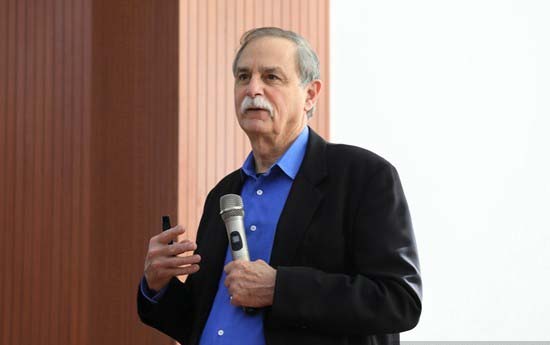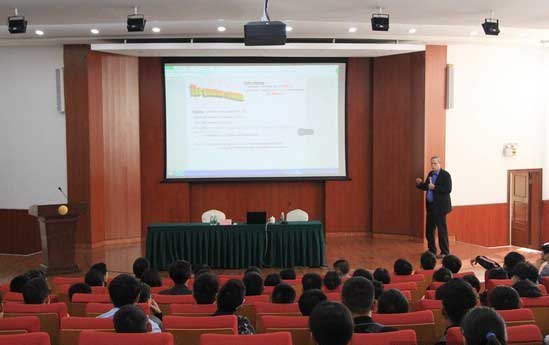
发布时间:2018-10-15 浏览次数:11969 文章来源:博雅翻译(成都)公司
2018年10月10日上午,2012年诺贝尔物理学奖获得者、美国物理学家大卫·维因兰德教授在成都大学作了题为“量子计算机与薛定谔的猫(Quantum Computers and Schrödinger’s Cat)”学术讲座。博雅翻译(成都)公司为此次学术讲座提供专业口译服务。

大卫·维因兰德(David J. Wineland),2012年诺贝尔物理学奖得主,美国物理学家,1944年生于美国密尔沃基,美国标准技术研究所教授。1965年在加州大学伯克利分校获得学士学位,1970年在哈佛大学获得博士学位。在华盛顿大学读完博士后后,1975年进入美国国家标准局,现在在美国标准技术研究所任教。维因兰德是美国物理学会、美国光学学会的会士,美国国家科学院的院士。2012年诺贝尔物理学奖的获得者。他和法国物理学家沙吉•哈罗什(Serge Haroche)共同获得了2012年诺贝尔物理学奖,获奖理由是“突破性的试验方法使得测量和操纵单个量子系统成为可能”。他们开启了一个量子物理新时代的大门,科学家由此可以在不对单个量子产生破坏的情况下对其进行测量和操作,而这在之前被认为是不可能的。他们的突破性的方法,使得这一领域的研究朝着基于量子物理学而建造一种新型超快计算机迈出了第一步。就如传统计算机在上世纪的影响那样,或许量子计算机将在本世纪以同样根本性的方式改变我们的日常生活。也可以用来制造极精准时钟,用于未来的时间标准,比现有的铯原子钟精确百倍。

维因兰德教授围绕为什么要开发量子计算机、科学史上的有名的奇怪生物——“薛定谔的猫”,和令他摘得诺贝尔奖的激光冷却技术几个方面分享了他的研究经历和心得。维因兰德教授指出,今天的高科技没有一样离得开量子力学,量子力学动摇了物理世界严格的因果律,随机性是量子世界的基石,这种随机性即是量子的“叠加”和“量子纠缠效应”。为验证这一设想,奥地利著名物理学家薛定谔提出了“薛定谔的猫”这一思想实验,试图从宏观尺度阐述微观尺度的量子叠加原理的问题,他巧妙地把微观物质在观测后是粒子还是波的存在形式和宏观的猫联系起来,以此求证观测介入时量子的存在形式。基于量子纠缠现象,人们提出了量子计算机的概念,量子计算机的十个量子比特记录的不再是一个10位二进制数,而是2的10次方个二进制数,量子算法的优势将实现量子计算机数据存储和处理能力指数级的提升。维因兰德教授用一张张图表,深入翔实地阐释了量子计算机原理和发展。他还详细的介绍了自己的研究领域—用激光来冷却保罗阱的离子、用陷俘离子的概念来实现离子计算机的量子门。维因兰德教授表示,未来量子计算机将以根本性的方式改变我们的日常生活。
(部分图文转自成都大学网站)